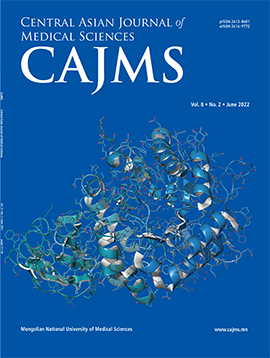Association Between Consumption of Sugar-sweetened Beverages and Childhood Obesity and Overweight
DOI:
https://doi.org/10.24079/cajms.2016.02.010Keywords:
Beverages, Childhood Obesity, Weight GainAbstract
Objectives: This paper aims to study how consumption of beverages relates to the body weight of children and adolescents in Mongolia. Methods: A cross sectional survey was conducted between 2015 and 2016. A group of 353 relatively healthy children and adolescents aged 6-16 were selected from ger districts of Ulaanbaatar, Mongolia. Descriptive statistics were used to summarize the data. Chi-squared analysis was conducted to evaluate the association of categorical variables with body mass index (BMI) z-score subgroups. T-test or two-way ANOVA was performed to compare means. Beverage consumption was presented as means with standard deviation (SD) among sex and age groups. Results: The data from 347 children and adolescents were analyzed. Boys represented 50.1% (n =174) and the mean age ± SD was 10.0 ±2.9 years. Tea was the main beverage type in all age and sex groups compared to other types of beverages. Girls aged between 10 and 13 years old had the highest consumption of sugar-sweetened beverages (SSB). And there was a markedly high consumption of SSB among overweight and obese children. Conclusion: Significantly higher consumption of SSB was seen among overweight and obese children. Detailed household and school-based observational and interventional studies should be performed using these findings to help policy makers to make evidence-based decisions about SSB.
Downloads
315
Downloads
Published
How to Cite
Issue
Section
License
Copyright (c) 2016 Mongolian National University of Medical Sciences

This work is licensed under a Creative Commons Attribution-NonCommercial 4.0 International License.




